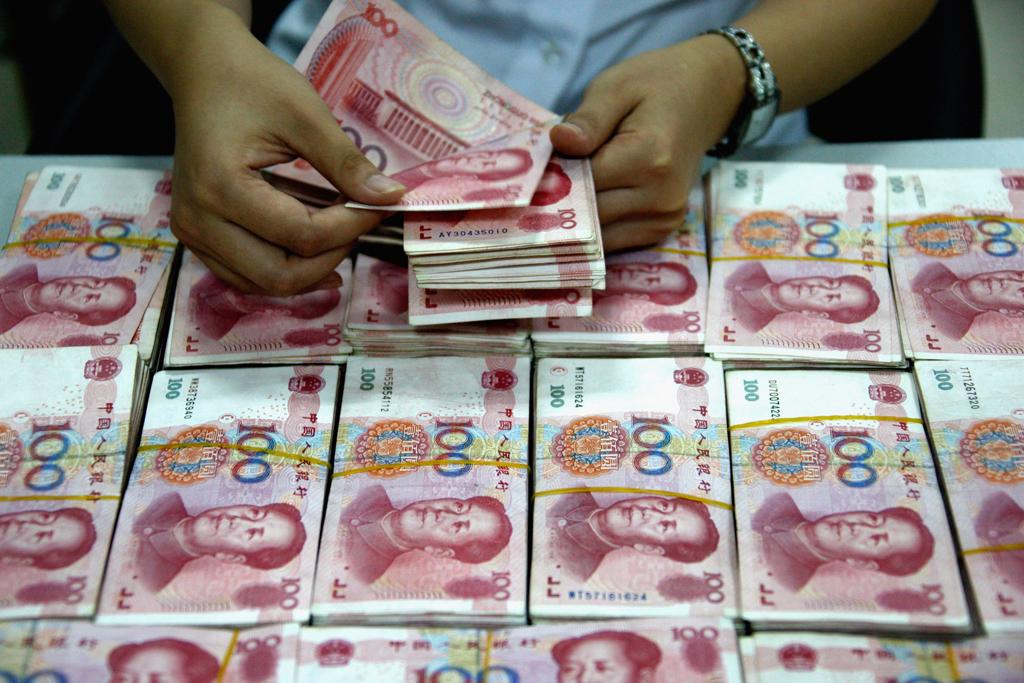Yuan surge shows China isn’t worried about economy
Industrial and Commercial Bank of China Ltd. in Huaibei, Anhui Province on April 18, 2011.
A record high yuan has raised some eyebrows in the financial markets, as investors weigh the negative impact the strong currency would have on the Chinese economy, which lately seems to be hitting some road bumps in its recovery.
But analysts say the fact that Beijing has continued to guide its currency higher shows that policymakers are confident in the health of the world's second largest economy.
The yuan surged to a record high on Thursday at 6.1537 against the U.S. dollar, after steadily appreciating 0.6 percent over the past few weeks, although on Friday it came back a little.
"The authorities haven't acted yet which shows that there is not an extreme concern that the appreciation of the renminbi will have a strong impact on the economy. We are not at the stage of intervention yet," said Alistair Thornton, chief economist at consulting firm IHS Global Insight.
The yuan is currently allowed to rise or fall by 1 percent in either direction from a level fixed against the dollar each day by the country's central bank. The band was last widened a year ago.
A further appreciation in the yuan could put pressure on Chinese exports, which have declined in recent months, raising concerns over China's economic health.
For example, in this week's official Purchasing Manager's Index (PMI) a sub-index measuring new orders fell from 52.3 in March to 51.7 in April and new export orders fell from 50.9 in March to 48.6 in April, its lowest level since January. A reading above 50 signals expansion, while below that contraction.
"It's a very interesting dynamic. A weaker economy normally equates to a weaker currency. As we know exports have suffered, so theoretically you would expect the authorities to either weaken the yuan or stop its appreciation," said Thornton.
In recent times Beijing has widened the yuan's trading band letting market dynamics play a greater role in the currency's movement.
Thornton said the lack of intervention from the central bank indicates that China's slowing growth is not considered to have slowed to a crisis level at this point.
"In more recent years the authorities have tried to bow to market pressure and only intervene when necessary as we saw mid last year," he said.
Other fundamental drivers like a rapid increase in capital flows are also being viewed as a reason for the recent appreciation in the yuan. For example, the central bank data show that in January a record 683.7 billion yuan ($109.9 billion) worth of foreign currencies were bought by banks in China.
According to Alistair Chan, economist at Moody's Analytics, the central bank is no longer monitoring the yuan closely, which is rising owing to capital inflows.
"There have been a lot of capital inflows in the last few months and that's played a part in driving the renminbi. They have allowed it to be strong for a while," he said.
"The central bank is not focusing much on the currency these days. They've widened the trading band and it's much more volatile. Also if there is downward pressure on the yuan that could lead to a pick-up in inflation and would mean China would be back to where it started, so they would be careful about doing that," he added.
China's gross domestic product (GDP) growth in 2012 at 7.8 percent marked its slowest pace since 1999, while growth for the first quarter of 2013 disappointed at 7.7 percent below 7.9 percent in the previous quarter.
According to Shuang Ding, economist at Citi, the Chinese authorities would only start getting really concerned about growth if employment numbers fell dramatically. According to official data China's urban unemployment rate at the end of March was 4.1 percent, unchanged from end 2012.
"The growth rate is obviously a concern for the Chinese government, but the key is employment. In Q1 although growth slowed, there was no large scale drop in employment which shows the economy is not running below its potential," he said.
Ding also said the recent slowdown in export figures would be balanced out by other fundamental drivers of the yuan, which he expected to continue to appreciate.
"Export growth may be slowing, but trade surplus is expected to be sizable this year, indicating the yuan is still undervalued and has room to appreciate. In addition, capital inflows also add upward pressure for appreciation," he said.
China's trade account recorded a surplus of $43.1 billion in the first quarter, compared with a much smaller surplus of $0.7 billion in the same period last year.
More from our partner, CNBC:
CNBC: JPMorgan Warned Over Energy Market 'Schemes'
CNBC: Dealing in Drones: Big Business of Unmanned Flight
CNBC: Back in Business: Jobs Picture Brightens in April
Every day, reporters and producers at The World are hard at work bringing you human-centered news from across the globe. But we can’t do it without you. We need your support to ensure we can continue this work for another year.
Make a gift today, and you’ll help us unlock a matching gift of $67,000!
